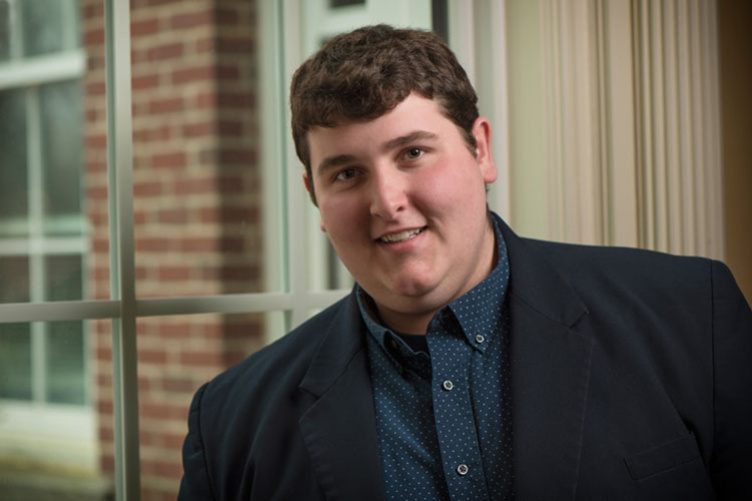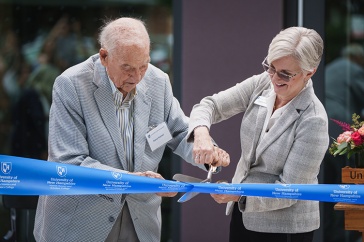
Each year, five stellar students are selected through a competitive process to serve as fellows in the College of Liberal Arts. During their final year of study, these COLA ambassadors work with prospective students, parents and donors. Michael Mignanelli is among that esteemed group, and is also the recipient of the John C. Rouman scholarship, awarded to that student who shows the greatest promise in the study of the Classics.
This was his first trip to Europe, and Michael Mignanelli wasn't going to miss anything. But, the newly minted McNair scholar and first-generation college student from Campton, N.H., had to write a major research proposal and it was due that summer.
So, after studying at the "Centro," a prestigious semester-long program for classics majors in Rome, he stored his luggage and filled his backpack with books and papers. During long bus rides around Europe, using his thumbs, he typed away on his cellphone. He also became an expert at finding hotspots for Wi-Fi in order to email his adviser, Assistant Professor Harriet Fertik. Finally, he submitted the completed proposal from Berlin, Germany. His successful proposal became his honors thesis: "Understanding Athenian Sentiments towards Public Speaking: A Study of Aristophanes' 'Ecclesiazusae.'"
He tells this story with a self-deprecating sense of humor and just a trace of amazement.
And if you think the title of Aristophanes' play is daunting, consider that the play itself contains the longest word in Greek at 171 characters. * (It's a culinary term.)
"Aristophanes was always creating language," says Mignanelli. "This political playwright of the fourth and fifth century B.C. was a real political instigator. He was the Jon Stewart of the ancient world, putting on these fantastic plays attacking ideologies and examining issues of public speaking and democracy. Reading the play in Greek is very entertaining…"
But, it takes awhile to learn ancient Greek.
Mignanelli began his first year at UNH, majoring in political science, with sensible plans to become a lawyer. He also studied Latin with Senior Lecturer Susan Curry. Yet, as he tutored other Latin students, he found that he loved it. When his political science professor learned that Mignanelli was interested in ancient political thought, he suggested that Mignanelli study ancient Greek.
"I was very resistant at first to all of the accents and breathing marks that Professor Brunet taught me," recalls Mignanelli. "As I got better with the accents, I started to enjoy it. When I studied Aristophanes, definitely, Greek just clicked. I quickly got interested in how these dramatists were critiquing their own societies."
By sophomore year, Mignanelli had changed his major to classics. He also became a long-standing instructional assistant for the department's general education course, mythology. Each section has about 200 students and this past spring, Mignanelli managed two sections. "With that course," says Mignanelli, "it's not just to get a better understanding of the ancient world. Greco-Roman mythology is a key to understanding cultural references of the last two thousand years."
Still Mignanelli's path was not really clear until he went to Rome to study at the Intercollegiate Center for Classical Studies (the Centro) and interned in archeology at the American Academy in Rome. "My favorite place was the ancient port city, Ostia Antica," says Mignanelli. "You can take public transit there from Rome and spend the day. There are wonderful mosaics and a beautiful, small outdoor theatre. The whole trip to Europe was transformative. I realized that I never wanted to give up this study. To understand our own society, learning about the ancient Greek and Roman world is essential, because they invented the wheel of the modern world."
Next fall, Mignanelli will begin his graduate studies in classics at the University of Texas at Austin on a full scholarship.
* The word: λοπαδοτεμαχοσελαχογαλεοκρανιολειψανοδριμυποτριμματοσιλφιοκαραβομελιτοκατακεχυμενοκιχλεπικοσσυφοφαττοπεριστεραλεκτρυονοπτοκεφαλλιοκιγκλοπελειολαγῳοσιραιοβαφητραγανοπτερύγων.
Written by Carrie Sherman
















































